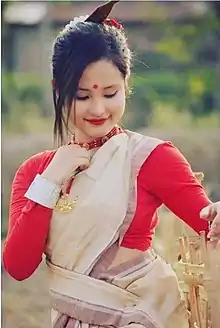 A Thengal kachari girl in Muga dress. | |
| Regions with significant populations | |
|---|---|
| Upper Assam | |
| Languages | |
| Assamese | |
| Religion | |
| Ekasarana Dharma | |
| Related ethnic groups | |
The Thengal Kachari people are an indigenous ethnic group of Assam, India.[1] They are a part of greater Bodo-Kachari family.They are manily concentrated in the Jorhat, Golaghat, North Lakhimpur, Nagaon and Karbi Anglong districts.Their traditional festival is "Tora Chira" bihu.They commonly known as "Kachari" people.
Etymology
There are different theories regarding the origin of the term Thengal. As per the census of India, 1891, the Thengal kacharis derive their name from an ancestor who is said to have ascended to heaven leg foremost.[2] But according to Jogeswar Borah, earlier the Thengals used to wear a pantaloon called "Thenga" from which the name has been derived.[3]
They are also called as 'Rupowal' from their traditional occupation as silver washers. However, some people in recent time don't prefer this term.[3]
History
Historical accounts on Thengals are very scarce. According to Hiteswar Borbaruah, some Sonowals used to procure silver in the Dhansiri river and were called Thengals or Rupowal. But earlier they were known by the name "Rupiya thakur".[4]
Culture
Thengal kachari is a functional group that were silver washers by profession during the Ahom rule. They practice endogamy and reported to be inhabiting the eastern portion of the Brahmaputra valley. They are advanced Hindus than the Sonowal Kacharis, but indulge in forbidden food and drink. They do not worship or sacrifice to idols. Various animistic practices are still prevalent. And they engage a brahmin in marriage, but with the advent of Ekasarna Vaishnavism this practice has declined.
Clans
Thengals have twenty one exogamous clans each of which was formed according to various occupations. They are 1. Hajowal, 2. Manikial, 3. Muktal or Mukutial, 4. Durrungial, 5. Dalangiyal, 6. Sakuriyal, 7. Haigiyal or Sargial, 8. Xukrial, 9. Hogral, 10. Biyagharal, 11. Kumral or Kumarial, 12. Dekral or Dhekiyal, 13. Nangal, 14 Lathiyal, 15. Neguriyal, 16. Dinkgiyal, 17. Dhuliyal, 18. Formal, 19. Ejmal, 20. Mekheliyal. Marriage within the same clan is strictly prohibited.[5]
Language
The language of Thengals is Assamese. However, there are some phonetic variations in their speech due to their Tibeto-burman background. According to Nanda Bora, the language of Thengal and Sonowal Kacharis is actually Assamese. In the past, their language was under the Boro-Garo languages but the circulation of the language is no more present. At present their mother tongue is Assamese.[6]
Marriage
Marriage in the Thengal kachari community involves Vedic rites and rituals. There are basically three types of marriage 1. Bor biya, 2. Abioi Biya or Juron Diya Biya, and 3. Poluai ana Biya.[3]
Festivals and customs
Festivals
- Tora Chira Bihu
- Suwa utuwa utsav
- Panitula Sabah
- Bihu
Customs associated with folk belief
- Ai Sabah
- Apeswari Sabah
- Mritakok diya
- Shiva worship
Customs associated with worship of spirits
- Jakh-Jakhini puja
- Ga Dangoria puja
- Bhitar Sokam
- Sani gharar sawul
- Jal Debota puja
- Lakhimi sal
- Tupula Bandha
- Pir diya
Religion
The Thengals are mostly the followers of Vaishnavism and they were initiated by Basudev Gosain of Auniati satra. Hence they are the followers of Brahma Samhati and obeys the Vedic rites and rituals and are known as Bamonia as they engage Brahmin priests in their religious ceremonies or Mahekia as they conduct funeral feast after a month. Besides, there are two more sections of Thengals, one of which is called Nam-kirtania or Hari-dhanis and follows Eksarana Naam Dharma and are under Srimanta Sankardeva Sangha and the other section have taken the Ek Saran Bhagabati Dharma and initiated into the mode of worshiping of Mahapurushiya Dharma also called Egharoh Diniya as they conduct funeral feast after 11 days.
The Thengals are completely Hinduised. However, the Bamunia section are seen to have retained some of their animistic rituals.[7]
See also
Notes
- ↑ (Muthukumaraswamy 2006, p. 79)
- ↑ Census of India 1891: Assam. Report. 1892.
- 1 2 3 (Dutta 2010)
- ↑ (Borboruah 1997)
- ↑ Borah, Jogeswar. Sinar pora Doiyangoloi.
- ↑ Bora, Nanda. Asamor Thengal kacharir itibritta.
- ↑ Bora, Jyotika (2007). The Thengal kacharis of Assam: A sociological study.
References
- Bakshi, S.R.; Sharma, S.R.; Gajrani, S. (1998). Contemporary Political Leadership in India: Sharad Pawar, the Maratha legacy. Contemporary Political Leadership in India. APH Publishing Corporation. p. 8. ISBN 978-81-7648-008-6.
- Muthukumaraswamy, M.D. (2006). National Folklore Support (India) Centre Folklore as Discourse. National Folklore Support Centre. ISBN 978-81-901481-6-0.
- Dutta, Kailash (31 December 2010). "Ethnicity and folklore a study among the Thengal Kacharis of Assam". University.
- Borboruah, Hiteswar (1997). Ahomar Din Ed. 2nd.